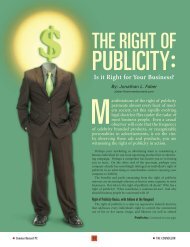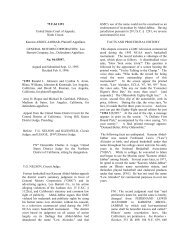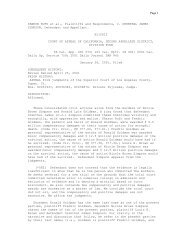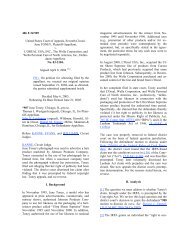Johnny Carson v. Here's Johnny Portable Toilets ... - Right Of Publicity
Johnny Carson v. Here's Johnny Portable Toilets ... - Right Of Publicity
Johnny Carson v. Here's Johnny Portable Toilets ... - Right Of Publicity
You also want an ePaper? Increase the reach of your titles
YUMPU automatically turns print PDFs into web optimized ePapers that Google loves.
FN5. Ed McMahon arguably has acompeting publicity interest in this samephrase because it is said by him in adistinctive and drawn out manner as hisintroduction to entertainers who appear on"The Tonight Show," including <strong>Johnny</strong><strong>Carson</strong>.The second policy goal of fostering the production ofcreative and intellectual works is not met by themajority's rule because in awarding publicity rights ina phrase neither created by him nor performed byhim, economic reward and protection is divorcedfrom personal incentive to produce on the part of theprotected and benefited individual. <strong>Johnny</strong> <strong>Carson</strong> issimply reaping the rewards of the time, effort andwork product of others.Third, the majority's extension of the right ofpublicity to include the phrase "<strong>Here's</strong> <strong>Johnny</strong>" whichis merely associated with <strong>Johnny</strong> <strong>Carson</strong> is notneeded to provide alternatives to existing legalavenues for redressing wrongful conduct. Theexistence of a cause of action under section 43(a) ofthe Lanham Act, 15 U.S.C.A. § 1125(a) (1976) andMichigan common law does much to undercut theneed for policing against unfair competition throughan additional legal remedy such as the right ofpublicity. The majority has concluded, and I concur,that the District Court was warranted in finding thatthere was not a reasonable likelihood that membersof the public would be confused by appellee's use ofthe "<strong>Here's</strong> <strong>Johnny</strong>" trademark on a product asdissimilar to those licensed by <strong>Johnny</strong> <strong>Carson</strong> asportable toilets. In this case, this eliminates theargument of wrongdoing. Moreover, the majority'sextension of the right of publicity to phrases andother things merely associated with an individual isnot conditioned upon wrongdoing and would applywith equal force in the case of an unknowing user.With respect to unjust enrichment, because acelebrity such as <strong>Johnny</strong> <strong>Carson</strong> is himself enrichedby phrases and other things associated with him inwhich he has made no personal investment of time,money or effort, another user of such a phrase orthing may be enriched somewhat by such use, butthis enrichment is not at <strong>Johnny</strong> <strong>Carson</strong>'s expense.The policies behind the right of publicity are notfurthered by the majority's holding in this case.II. Countervailing Interests and ConsiderationsThe right of publicity, whether tied to name,likeness, achievements, identifying characteristics oractual performances, etc. conflicts with the economicand expressive interests of others. Society's interestsin free enterprise and free expression must bebalanced against the interests of an individual seekingprotection in the right of publicity where the right isbeing expanded beyond established limits. Inaddition, the right to publicity may be subject tofederal *840 preemption where it conflicts with theprovisions of the Copyright Act of 1976.A. Federal Policy: MonopoliesProtection under the right of publicity creates acommon law monopoly that removes items, wordsand acts from the public domain. That federal policyfavors free enterprise was recently reaffirmed by theSupreme Court in National Society of ProfessionalEngineers v. United States, 435 U.S. 679, 98 S.Ct.1355, 55 L.Ed.2d 637 (1978), in which the SupremeCourt indicated that outside of the "rule of reason,"only those anticompetitive restraints expresslyauthorized by Congress would be permitted to stand.Id. at 692 n. 18, 98 S.Ct. at 1365 n. 18. Concern forthe impact of adopting an overbroad approach to theright of publicity was also indicated in this Court'sdecision in Memphis Development Foundation v.Factors Etc., Inc., 616 F.2d 956 (6th Cir.), cert.denied, 449 U.S. 953, 101 S.Ct. 358, 66 L.Ed.2d 217(1980). In Memphis Development, this Court heldthat the right of publicity does not survive acelebrity's death under Tennessee law. In soholding, this Court recognized that commercial andcompetitive interests are potentially compromised byan expansive approach to the right of publicity. ThisCourt was concerned that an extension of the right ofpublicity to the exclusive control of the celebrity'sheirs might compromise the efficiency, productivityand fairness of our economic system withoutenlarging the stock or quality of the goods, services,artistic creativity, information, invention orentertainment available and detract from the equaldistribution of economic opportunity available in afree market system. Id. 959-60. MemphisDevelopment recognized that the grant of a right ofpublicity is tantamount to the grant of a monopoly, inthat case, for the life of the celebrity. The majority'sgrant to <strong>Johnny</strong> <strong>Carson</strong> of a publicity right in thephrase "<strong>Here's</strong> <strong>Johnny</strong>" takes this phrase away fromthe public domain, giving him a common lawmonopoly for it, without extracting from <strong>Johnny</strong><strong>Carson</strong> a personal contribution for the public'sbenefit.Protection under the right of publicity confers amonopoly on the protected individual that ispotentially broader, offers fewer protections and







